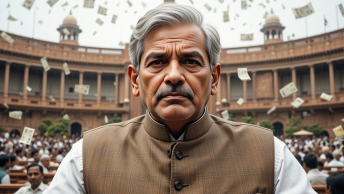The Naz Foundation case is coming up before the Chief Justice’s Bench tomorrow. It is listed as Item No.8. The causelist shows that there are as many as 13 SLPs which will be heard together. Meanwhile, one of our readers, K.V.Dhananjay, has raised the following interesting issue with regard to the hearing of the case:
The decision of the Supreme Court in the case of Laloo Prasad Yadav v. State of Bihar delivered on April 1st, 2010 establishes a principle that where the Government of India waives its right to appeal a decision of a court, even a directly-and-immediately affected State Government cannot step into the shoes of the Government of India and prefer an appeal in place of the Government of India.
Although the above judgment was delivered as an interpretation of the provisions of the Criminal Procedure Code, the reasoning employed by the Supreme Court would have equal application to all other cases where the proper Government waives its right to appeal and a different party seeks to appeal in place of the proper Government.
In the above case, the Government of India, despite public furore, chose not to appeal the acquittal of Laloo Prasad Yadav. This inaction led the Bihar Government to substitute itself for the Government of India and to appeal the acquittal before the Higher Court. The Supreme Court has held that the State Government did not have locus to compensate for the absence of appeal by the Government of India, and that if the Government of India chose not to appeal, the matter ends there.
The above reasoning, therefore, squarely applies also to the appeals preferred by private parties against the Naaz judgment before the Supreme Court. The Government of India was the losing Respondent in the Delhi High Court in the Naaz matter, and it took a conscious decision to not appeal the Naaz judgment to the Supreme Court.
The Naaz appeals to the Supreme Court is not even a case where any State Government has sought to appeal in place of the Government of India. Rather, it is a case where purely private parties are asking the Supreme Court to allow them to compensate for the absence of the Government of India and to appeal Naaz judgment. Applying the central principle of the Constitution Bench decision in Laloo Prasad Yadav’s case, the Supreme Court is now bound to dismiss all appeals filed by private parties against the Naaz judgment – given that the Naaz appeals will be heard on Thursday by the Supreme Court and this would be the first practical occasion for the Court to apply the principle it has just delivered in the Laloo Prasad Yadav judgment.
If an analogy could be drawn here and a State Government could be likened to a ‘child’ and the Central Government to a ‘father’, the Court has essentially held that not even a ‘child’ can appeal in place of the ‘father’. The Naaz judgment appeals are more in the nature of a ‘neighbour’ wanting to appeal in place of the ‘father’! The obvious legal conclusion is that the appeal preferred by private parties is not at all maintainable, and the Naaz appeals are liable to be dismissed forthwith.
There is not ONE argument that the private parties in the Naaz appeal could possibly make which the Government of Bihar could not have made in the Laloo Yadav’s case.
However, some might argue that the facts in Laloo Yadav’s case and in Naaz Foundation are very diverse from one another, and that the judgment in Laloo Yadav’s case cannot be applied to the Naaz appeals. Notwithstanding huge diversity in facts, the principle of law that one gathers from Laloo Yadav’s case is fully applicable to the Naaz appeals.
At any rate, the Laloo Prasad decision appears to have not accorded any weightage to the argument that a different party who appeals could suffer from a lack of information, and that such lack of information could prejudice the appeal. Similarly, the Supreme Court did not accord any weightage to the argument that a higher Court could, in exercise of its inherent powers, allow a different party to appeal in place of the original litigant on grounds of Public Policy. If at all the Court were to be allow the Naaz appeals to continue by evolving a new legal principle based on the above two arguments, such new principle is bound to cast doubts on the correctness and enduring nature of the decision in Laloo Prasad case. So, should the Naaz appeals continue in Court, the Laloo Yadav decision, too, will have to be reconsidered by the Court.
Therefore, the Laloo Prasad decision rendered 4 days ago now cuts the ground from under the feet of the Naaz appellants.
And, should Naaz appeals be dismissed by the Supreme Court, effective the date of dismissal, Section 377 will cease to operate across India – in the manner decided by the Delhi High Court in the Naaz judgment.
CORRECTION: An earlier version of this post suggested that the decision in the Laloo Prasad case was delivered by a 5-Judge Constitution Bench. This inadvertent error has now been corrected, thanks to a reader pointing it out.







Dhananjay post tells us exactly why the decision in Lalu's case is horribly wrong. The present CJI has lowered the SC standards.
Day in and day out appeals are filed by parties who were not a party in the court below. That's why in many SC orders it is noted "permission to file SLP is granted."
Also on facts, Bihar govt had a legitimate claim to file the criminal appeal after acquittal by a CBI court since the public exchequer of that state had to bear the burden of the scam in which Lalu was allegedly involved.
strictly speaking, parties have filed SLPs in the Naz case – no one has 'appealed'. haven't seen the yadav judgment, but does it apply to SLPs too?
The Lalu Prasad Yadav case dealt with the competence of the state government to file an appeal before the High Court against the acquittal. The Naz Foundation case, as Tarunabh rightly points out is an SLP before the Supreme Court and there is nothing in the judgment which expressly bars the same. Second, the Lalu Prasad Yadav case dealt with an appeal against an acquittal filed by a non-party, which squarely leads to questions of competence and locus. The Naz foundation case is a constitutional matter, which if I understand rightly was a public interest litigation before the Delhi High Court. Legally, the matter before the Supreme Court is filed by way of SLP and the Supreme Court thus has discretion whether to grant leave or not. Hence it seems to me, the fact of not being party to an earlier proceeding on the same matter in the High Court cannot be an in limine bar for filing the SLP. Even morally, if certain sections of the public have a right to bring the PIL to the High Court in the first place, other sections of the public aggrieved by the decision have a similar right to bring an SLP before the Supreme Court on this matter. The state, the respondent in the proceeding cannot be seen as the repository of the remaining sections of the public (who ostensibly do not support the petition) since this is not a criminal matter like the Lalu Prasad Yadav case was.
Extending the last commentator's logic, that would imply that any member of the public would also have the right to bring an SLP on a matter even if the original petitioner in an PIL case choose to accept the verdict of a High Court which had ruled against the PIL on merits.
Also, interestingly, the line of precedent I'm familiar with on the matter of interveners in India seems to indicate that overall interveners do not have separate rights to appeal against verdicts if the original petitioners and/or respondents do not do so.
Facts in Laloo Yadav and Naz are obviously, not identical. So what?
What is the legal principle in Laloo Yadav which is extinguished upon introduction of different set of facts? Does Naz involve such a set of different facts?
Certainly not. The Laloo Yadav judgment goes very far, as a principle of law.
To suggest that whatever principle of law that the Laloo Yadav judgment espouses is merely a principle for that case and that, it should fail to operate upon a different set of facts is obviously, unacceptable unless one first circumscribes that principle to a range of facts and identifies a special relationship between those facts and that principle – so that, upon diversity in facts, the principle loses its application. So, I expect that those who disagree with the post, will do well to get to the heart of the legal principle in Laloo Yadav and to begin their analysis thereafter.
Why are Naz appeals immune from the principle in Laloo Yadav?
A special leave petition is nothing more than a varied form of statutory appeal – a right is removed from the appellant while a power is still retained in the appellate court to entertain the appeal.
How does this diminution in the right of an appellant inform whether the appeal court could permit an original litigant to be substituted by another for the purpose of the appeal?
The power to entertain an appeal to the exclusion of a right in a party to insist upon appeal does not act as a source of power to also permit a different party to appeal as a substitute for the original litigant. A power to so permit a substitute party to appeal in place of the original litigant has no relation whatsoever to whether a Court sits as a court of appeal or as a court of appeal on special leave.
Rest of the arguments founded on other considerations weren't available to Bihar Government to similarly justify its appeal? What is there in Laloo Yadav judgment so as to limit its application to a criminal case only and not to a civil matter? What is the essential difference between a criminal and civil matter and why does any such difference inform a court differently as to its powers to permit a substitute in criminal cases only and not in civil matters?
Then, the public policy arguments. Where is the discussion in Laloo Yadav upon public policy considerations? So, if public policy considerations should lead to a different result in Naz appeals, how can Laloo Yadav judgment continue as a good law – barely a week after it is delivered?
If you wish to slam the Laloo Yadav judgment, please feel free to do so. But, do not wish away the consequences of that judgment upon the powers of an appellate court. I would be surprised if you wish to keep the Laloo judgment without also conceding a drastic and tumultuous curtailment in the the appellate powers of superior courts of law. The conclusion in Laloo Yadav, if faithfully applied, is bound to emphatically overwhelm those who desire that the unspecified powers of an appellate Court should be informed by public policy considerations.
Even in criminal cases, it is often the near & dear ones of the deceased who file the appeal if the state does not choose to do so.
Many SLPs have been filed by my office where the victim is dead and the prosecuting agency does not appeal from the HC order and many of them have been admitted by SC and the orders of the following nature have been passed:
"Leave granted/Issue notice. Permission to file SLP is granted."
The principal is the same in appeals and appeal with special leave.
But yes, the new party has to show exactly why it is so aggrieved so as to challenge the decision of the lower court. This is extremely essential. I can't file an appeal in a case between 2 residents of Tripura fighting a property case unless I am personally aggrieved. In a public interest matter, everyone can and should be allowed to appeal, provided he/she does some research and does not file a half-baked petition.